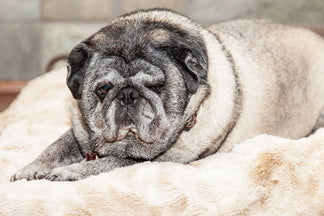Even if you think a little chub on your pet is cute, an overweight pet can have a shorter lifespan and a lower quality of life, not to mention, it can also be very costly to the pet parent. Here’s a look at exactly how costly it can be.
Medical Costs
According to the American Pet Products Association’s 2011-2012 National Pet Owners Survey, the average dog owner spends $248 per year on routine vet visits per year. Sound about right? I would argue that it is a little low and that the cost might be higher for metropolitan areas, but let’s say that it is close enough.
Now lets compare this to vet costs for dogs who have health issues related to being overweight. Similar to humans, diabetes and heart disease, and orthopedic problems are more common in overweight animals. As reported in the New York Times, the average cost to dog owners to treat diabetes is over $900 per year and the average cost to treat ortho problems such as treatment for arthritis and cruciate ligament tears, which can be caused by the strain of an overweight frame that weakens joints, can cost about $2,000. Wow! That’s a lot of money.
As astounding as those numbers are, they don’t even tell the whole story. First of all, there is no accounting for heart disease treatment or cost related to any of the other of the other health issues associated with an overweight dog, such as high blood pressure, breathing problems, and kidney disease.
Costs In the Aggregate
Let’s add it all up and see what the total National cost might be. According to APOP, there are 41.1 million overweight or obese dogs in this country. If the average cost for obesity related illness for these dogs averages only $200 per year, we have a total National cost of $8.2 billion dollars per year. For context, a stack of 1 billion $1 dollar bills would measure 358,510 feet or 67.9 miles. In our case, 8.2 billion would be a 557 mile long stack of bills.
Now What?
Now that we know about the staggering cost of having overweight dogs perhaps it will be a little easier to get our pets into better condition. Like with humans, adjusting your dog’s diet based on their size and activity level will eventually result in weight loss. But don’t over do it! Unlike the popular television program “Biggest Loser,” most vets suggest a gradual weight loss regime for your dog. Losing no more than 2% of weight per week is generally considered safe and will ensure that the dog’s weight loss is from fat tissue not muscle tissue.

 Health and Fitness
Health and Fitness
 Health and Fitness
Health and Fitness
 Health and Fitness
Health and Fitness
